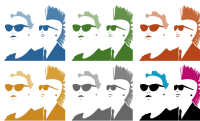
[caption id="attachment_1594" align="aligncenter" width="599"] © Lisa Jiang[/caption]
© Lisa Jiang[/caption]
On the morning of August 24th I had a phone call from Karl F Tullah wanting to meet up after work to discuss the short story "Tlön, Uqbar, Orbis Tertius" by Jorge Luis Borges. He had read something that had struck him as revolutionary. Before putting the phone down he also reminded me that on this day, in 1899, Jorge Luis Borges was born and having a little celebration was perhaps a good idea. After the usual boring administrative and bureaucratic activities of the day I met him at Athenaeum House. We both sat through a short lecture by Dr Mark Shovitz on "Swedenborg and the Subversive Politics of Mysticism" before returning to the foyer of the Library where we agreed to meet Professor Steinisch for a tea.
Karl F Tullah: I never realised that something so obscure as mysticism could have political implications. You seem as surprised as I am.
Nadim Bakhshov: It is the suggestion that mysticism is a form of political anarchism.
Karl F Tullah: Is that why religions and sciences label it heresy?
I paused and studied Karl's expression.
Nadim Bakhshov: So what is this revolutionary insight you wanted to talk about?
Karl F Tullah: Last week we discussed the Borges story 'The Aleph' and we both agreed that Borges was a literary alchemist, distilling images from Persia to Italy, from the mystical Sufi sects to the dolce stil novo of the great poets of Italy - and then generated new fictions out of these distillations. Like Poe, a writer of detective fiction, unlike Poe - explicitly philosophical. More radical than Joyce or Beckett - who, unlike Borges, have been canonised. And unlike Cortazar never politically active. And unlike Heidegger - unswayed by any particular political regime as a natural realisation of his deepest musings. Much like Beckett, a creator of autonomous art. Borges' work has a profound metaphysical - dare I say it, spiritual - dimension. And I find myself saying this today after reading "Tlön, Uqbar, Orbis Tertius" again.
Nadim Bakhshov: This is the story where Borges talks about some alien species that treats metaphysics as a form of fantastic literature. That the invention of a Don Quixote pales into trivia next to the writers and dreamers and mystics who constructed the Bible.
Karl F Tullah: Yes, that's the one. In this story metaphysics function to generate amazement.
Nadim Bakhshov: Here's my issue - and I've also been thinking about this for some weeks now. You can take it one of two ways: either as a liberating step - metaphysics can now be accorded the freedom we associate with the arts and allowed to create all kinds of new ontologies in the philosophical imagination. And these ontologies can then seep out into the world. Or, you can read it in a darker way. By turning metaphysics into a form of art you rob it of its intrinsic power and condemn it - it becomes nothing more than decoration, nothing more than a purely aesthetic pleasure-giving form. The era of Platonism - which I define as the fundamental linkage between ethics, ontology, metaphysics and politics - is over. Go to a metaphysical art gallery and enjoy the vast architectural thought of a Hegel or a Kant. But when you leave the gallery leave it behind. Are Borges' aliens mystics? That is the question.
Karl F Tullah: John and George have been talking about an education that generates alternatives to our current political, social and economic forms for some years. I think Borges belongs to that discussion.
Nadim Bakhshov: How?
Karl F Tullah: As Mark Fisher has so eloquently put it - capitalism has an ontology, even if it does not have a fully formed metaphysics. This ontology is rarely ever made explicit - especially in our public political and economic conversations. But you read any number of Zer0 book or Verso authors and you encounter a growing body of critical thought, forcing this capitalist ontology into the light, showing it for what it is: a parasitic number-based ontology.
Nadim Bakhshov: Numbers are more real than people.
Karl F Tullah: Borges provides a simple key to overturn it. His aliens are mystics.
Nadim Bakhshov: Really?
Karl F Tullah: I think so.
Nadim Bakhshov: Go on then.
Karl F Tullah: Firstly, metaphysics provides that basic conceptual categories for ontology. So those who claim to talk about reality, especially scientists, derive the substance of their basic terms from implicit metaphysical conceptions, typically born in the 17th century - even if they suppress these historical roots. Secondly, by liberating metaphysics from a pseudo-scientific delusion - I blame Aristotle for this - or its 20th century mind-numbingly dull linguistic turn - and rendering it as a form of postconceptual art we revive it, we supply it with the power and freedom to invent something new. The politics and social forms inside mystical thought possess radical and unsettling ontologies.
Nadim Bakhshov: Hang on!
Karl F Tullah: Hear me out. A key mystical axiom is this: the source, the ground, the root of all of existence is non-cognizable. It cannot be rendered into a totem, a symbol, a doctrine, a scripture or a product. You cannot buy it or sell it, own it or destroy it. It belongs to no group of people, is tied to no particular land or image of divinity. This mystical axiom means the most profoundly precious element, the so-called fifth element of medieval cosmology, is free and belongs to everyone. All mystical ontologies flow from this. This root pours signs into the world which point back to itself and to our deepest sense of being - it's strangely a bit like the Annunciation- but it's not just for one person at one time but going on constantly and is open to everyone.
Nadim Bakhshov: Capitalist logic shuts all of this down - a person is more like a 'node', a junction in a social network without any intrinsic inward connection to anything or anyone else. This junction then performs or fails to perform in its various situations - most of which are work-related. In capitalism nothing is free, only a way of hooking in the consumer. This mystical axiom, this non-cognizable, offends consumer sensibility.
Karl F Tullah: Without it we are left with a profoundly alienated cosmos.
Nadim Bakhshov: You take one massive step off into some alien metaphysics from a short story.
Karl F Tullah: I do. If metaphysics can be liberated from its current academic language-games and taken over to the arts, we will see it flourish with a creative freedom. It will give us images, ideas, possibilities of alternative ontologies, ethics,, politics and societies -
Nadim Bakhshov: Like Doug Lain's idea of a philosophical fiction?
Karl F Tullah: Yes.
Nadim Bakhshov: Excellent. Where can I sign up for more?
Nadim Bakhshov is author of forthcoming Zer0 books title "Against Capitalist Education" out on 11 Dec 2015.
Categories:
0 comments on this article







